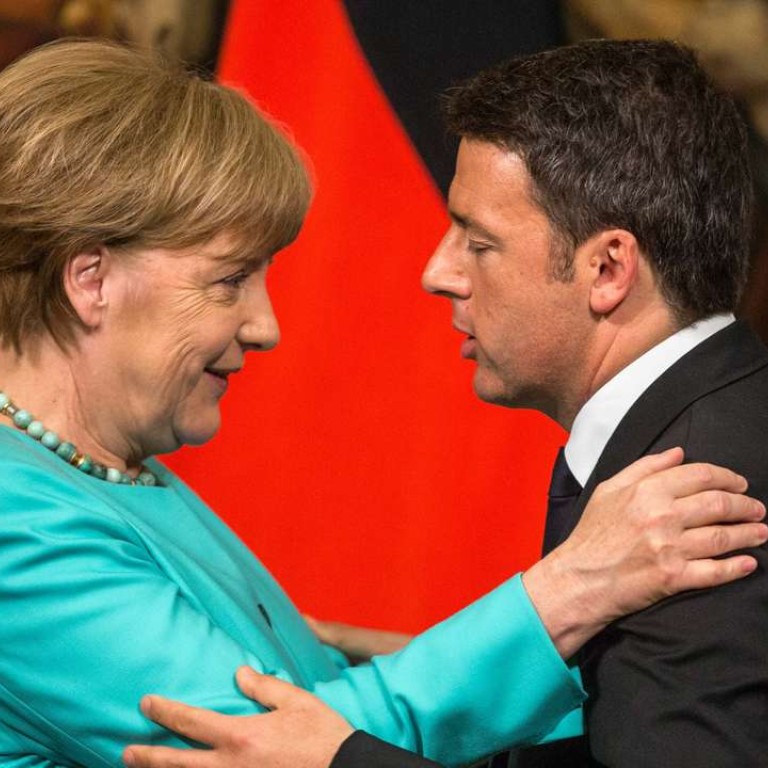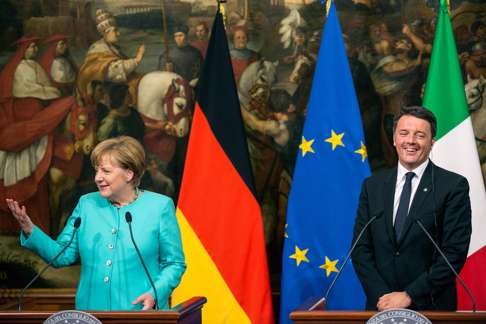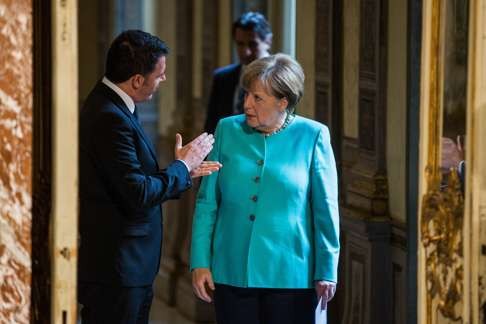
Italy, Germany agree on refugee policy, but not on funding
Italy and Germany agree on how Europe should tackle the refugee crisis and oppose any move to fence off borders, but they are at odds over how to fund proposed initiatives, the leaders of the two countries said on Thursday.
German Chancellor Angela Merkel and Italian Prime Minister Matteo Renzi warned that unless the European Union found a common migration stance, old nationalist ghosts would reawaken.
“Either we defend our external borders and we do it together or we risk falling back into nationalism,” Merkel said. “This is not a challenge for Greece, Germany or Italy, but these are challenges that have to do with the future of Europe.”
Immigration issues dominated talks between the two leaders, with both agreeing that more needed to be done to help African states stem migrant flows across the Mediterranean Sea.
Either we defend our external borders and we do it together or we risk falling back into nationalism
Almost 29,000 migrants have reached Italy by boat so far this year, roughly 1,000 more than in the same period last year.
Humanitarian organisations say this is now the main route for asylum seekers coming to Europe after an EU deal with Turkey dramatically slowed the flow of people reaching Greece.
Italy last month presented what it termed a “migration compact”, saying Europe should offer financial incentives to African nations to develop their own economies and discourage would-be migrants from leaving in search of a better life.
Renzi suggested this should be financed by issuing common EU bonds, but Merkel said she did not agree with this approach.
“Even though there are different views on the financing, we have the same opinion on the overall effort,” Merkel told a joint news conference, speaking through a translator.
Merkel said one billion euros (US$1.14 billion) would be needed to help African states halt the immigration exodus, specifically mentioning Niger. “If we concentrate on the European budget, we will find [the money],” she said.

Renzi said that he did not care where the money came from as long as a solution was found to halt the streams of migrants, who have rattled European unity and fueled the rise of far-right parties in many EU countries.
“What interests me are results. With or without eurobonds, the important thing is that the migration compact gives resources to help Africa, which is not happening now,” he said.
He repeated his fierce opposition to Austria’s plan to build a fence at its border with Italy to try to prevent migrants from heading to the wealthier north, saying Merkel shared his view.
“We expressed our total opposition to, and, in some ways, our shock over the position that has been taken by our Austrian friends,” Renzi said.
Austrian Interior Minister Wolfgang Sobotka said in Rome last month that as many as a million migrants were poised to cross the Mediterranean from Libya this year. Italy says the figure is likely to be much lower.

Renzi has been quick to criticise his EU partners and has clashed openly with Merkel in the past over what he sees as an ideological devotion in Berlin to budget austerity and perceptions that Germany has hegemony in EU decision-making.
German Bundesbank chief Jens Weidmann raised eyebrows two weeks ago when he criticised Italy for repeatedly breaking EU budget rules and urged further government reforms.
“We know ourselves what needs to be done. We will decide things with our European allies and we won’t let any governor of any foreign bank to tell us what to do,” Renzi said, adding: “I hope Weidmann succeeds in sorting out his own problems.”

